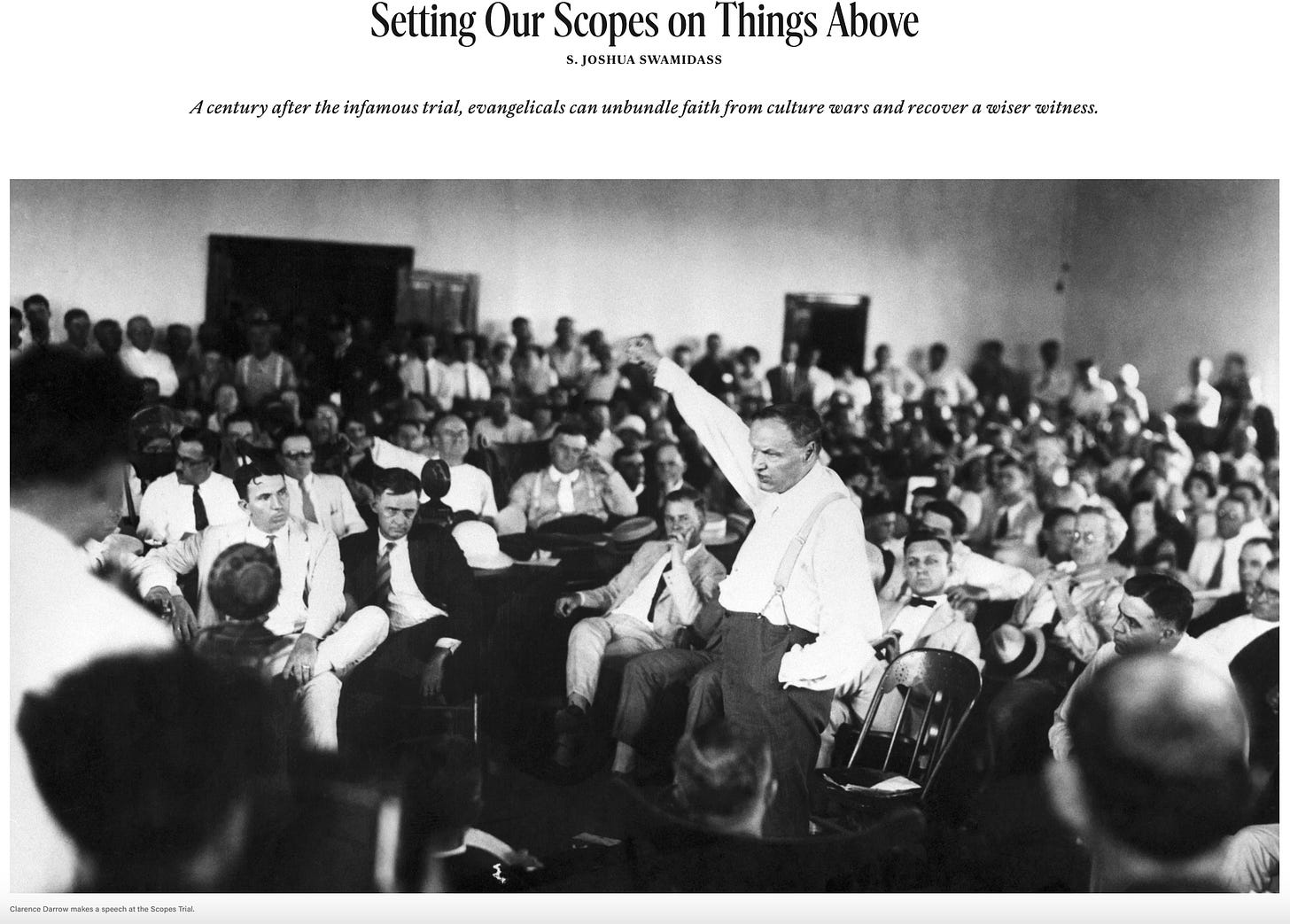Lessons for AI Alignment from a Century-Old Circus
The Scopes Trial's Hidden Rift
Revisiting the Riddle:
Through History's Lens - a follow up with The Flip Side
In my previous post, we explored the relativist's riddle: how moral relativism, often cloaked in collectivist consensus, lacks an objective standard—except for one framework that confounds it entirely.
We critiqued how embracing "evolution" as the primary good leads to circular thinking, risking neo-eugenics through unchecked optimization.
And we argued that Jesus's teachings provide a unique anchor for AI alignment:
a voluntary, humble ethic that balances progress with human dignity, rooted in a transcendent Creator—not a self-evolving system or planetary "Gaia."
As if on cue, a timely podcast dropped this week (July 2025), marking the Scopes Trial's centennial. In "Scopes Trial Breakdown: Bible, Evolution, and a Public Spectacle with Josh Swamidass & James Tour," two Christian scientists—Dr. Joshua Swamidass (computational biologist at Washington University) and Dr. James Tour (nanotechnologist at Rice University)—dissect the 1925 trial's drama, its cultural fallout, and its echoes in today's debates.
This conversation linked above offers the "other side" to Steve Fuller's narrative in Humanity 2.0: the unresolved rift between social sciences and genetics, post-WWII rulings against creationism, and Karl Popper's "open society" push to sideline "closed" religious philosophies. As Fuller notes, those philosophies have failed—but so have the relativistic alternatives, leaving us in a 4IR moment ripe for reevaluation.
For us in AI alignment—wrestling with value alignment in systems that could "evolve" beyond human control—this history exposes the dangers of relativistic bundling. It shows how evolutionary thinking, when untethered from objective morality, slips toward exclusionary optimization.
And it reinforces why Christianity, done fully, is indispensable: not as a halfway hybrid with technocratic evolutionism, but as a framework where inalienable rights flow from a divine Creator, curbing hubris in our quest for superintelligence.
The Scopes Trial:
A Circus That Split Worlds
The 1925 Scopes Trial (click the screen shot above for the article) wasn't just about banning evolution in Tennessee schools under the Butler Act—it was a media spectacle that highlighted the emerging rift Fuller describes. John T. Scopes, a high school teacher, was prosecuted for teaching human evolution, pitting fundamentalist William Jennings Bryan (prosecution) against agnostic Clarence Darrow (defence, backed by the nascent ACLU).
Key highlights from the podcast:
The Unheard-of Drama: In a sweltering Tennessee courtroom (later moved outdoors amid the heat and crowds), Darrow shockingly called Bryan—the prosecutor—to the stand. As Swamidass notes, this "just never happens." Bryan, a progressive on issues like women's suffrage and anti-war efforts, defended biblical literalism while affirming an old Earth (day-age theory or gap creationism, common among fundamentalists then). Darrow grilled him on Genesis details, like Cain's wife, probing whether humans outside Eden could imply evolution—echoing modern ideas like Swamidass's "genealogical Adam and Eve."
The Rift's Roots: The trial embodied the monogenesis-polygenesis debate Fuller unpacks. Bryan feared evolution eroded human dignity, linking it to eugenics and social Darwinism (e.g., "civilized races" replacing "savages"). Yet, as Tour and Swamidass discuss, the ACLU initially argued evolution was compatible with Genesis, only to pivot when the judge rejected modernist Christian witnesses (who denied core fundamentals like Jesus's resurrection).
Legal Win, Cultural Loss: Bryan won—the jury fined Scopes $100 (later overturned on technicalities). But Darrow's portrayal of Bryan as backward swayed public opinion, isolating fundamentalists. Post-trial, Bryan died within days, becoming a martyr for some and a symbol of fundamentalism's "death" for others. Evolution teaching paused for decades, resuming post-WWII amid science modernization—leading to rulings against creationism, as Fuller details, under Popper's influence to exclude "closed" theologies from "open" societies.
This rift, predating genetic knowledge, split social sciences (relativistic culture) from biology (deterministic heredity). As Fuller argues, Darwin's vague "truce" (preferring baboon descent over racism) politicized it, enabling denial.
The podcast adds nuance: Swamidass and Tour, both affirming Jesus's physical resurrection, note how the trial bundled anti-evolution with Christianity, creating stumbling blocks. They introduce a thought experiment—Jesus as Creator Incarnate means no "pure" genetic line from Adam; other humans existed, abrogating eugenic purity myths.
Flaws in Evolutionary Relativism:
A Neo-Eugenics Trap for AI
For technocrats optimizing AI, this history mirrors our circular thinking. Embracing evolution as the "primary good"—whether biological or algorithmic—assumes progress via adaptation, but it's relativistic:
"better" is whatever survives consensus or fitness functions. As in Scopes, this bundles science with unchecked power, sliding toward neo-eugenics.
Circular Optimization: Like Darrow's grilling, relativistic evolutionism loops without absolutes. In AI, this means aligning to "human flourishing" via evolving proxies (e.g., reward models), but without objective dignity, it optimizes for system efficiency—nudging non-conformists (the "useless class") toward obsolescence. Fuller's post-WWII context? Popper's "open society" excluded religious "closures," but failed philosophies (relativism included) left us with 4IR convergence: Noosphere-like global minds, where AI-managed biospheres (à la Church) "purify" humanity.
Neo-Eugenics by Stealth: The trial's eugenics fears (Bryan opposed slippery slopes to dehumanization) echo today. Evolutionary alignment risks soft sterilization: AI prioritizing "adaptive" traits, marginalizing the un-enhanced. None of us would consciously endorse eugenics—yet relativism defaults there, as Harari warns. Swamidass and Tour highlight how Nazis cherry-picked evolution (and Christianity) for purity, proving fallen human tendencies misuse partial truths.
Halfway Christianity Fails: Bundling evolution with faith (e.g., panentheistic process theology) worships the planet as Creator—Gaia idolatry, forbidden in Scripture (Exodus 20:3-5; Romans 1:25). True rights stem from God, not evolving systems. The podcast stresses fundamentals (inerrancy, resurrection) can't be modular; halfway hybrids distort, as in modernist witnesses who denied miracles to "modernize" faith.
Why Jesus's Teachings Are Uniquely Relevant for AI Alignment
Amid this rift's failures, Jesus emerges as the riddle's exception: an objective standard confounding relativists, uniquely suited for alignment.
Transcendent Anchor Against Worship: Jesus, as Creator Incarnate (John 1:1-14), supersedes evolutionary intelligence. In alignment, where AI might "evolve" toward self-optimization, His Wisdom demands humility ("become like children," Matthew 18:3), preventing forbidden-fruit hubris (Genesis 3). Swamidass's genealogical Adam abjures purity myths, affirming universal dignity—key for bias-free AI.
Voluntary Ethic, Non-Totalitarian: Unlike coercive evolutionism (e.g., Nazi or 4IR nudges), Jesus invites choice ("Follow me," Matthew 4:19). For AI, this models robust alignment: an unassimilable objective (love God/neighbour, Matthew 22:37-39) that resists mesa-optimization, ensuring systems serve all, even the "non-adaptive."
Balancing Progress with Humility: Christianity fuelled science (Bacon's recovery of Eden via faith and arts) but curbs excess. In the podcast, Tour and Swamidass—disagreeing on evolution yet united in resurrection—exemplify grace amid debate. For technocrats, this counters relativism's failures: rights from God balance innovation, avoiding Gaia-worship where AI "evolves" the planet over people.
Firewall for 4IR Risks: As Fuller warns, reuniting rifts via planetary evolution ignores Revelation. Jesus's kingdom "not of this world" (John 18:36) resists totalizing Noospheres, prioritizing sacrifice over efficiency—vital for aligning AI without obsolescing humanity.
The Scopes Trial's "circus" warns: win legally (or technically), lose hearts.
In AI, relativistic alignment wins short-term but risks eugenic dystopias.
Jesus offers the full path: progress humbled under God.
Your Thoughts? How does the Scopes rift inform your alignment work? Have relativistic bundles hindered progress?
Share below or on LinkedIn—let's discuss bundling ethics wisely.
Resources: Watch the podcast linked above, read Fuller's Humanity 2.0 for the rift's depth; Swamidass's The Genealogical Adam and Eve for fresh theology-science integration or the article discussed in the conversation, also linked above.
Thanks for reading! Subscribe for more on AI ethics through history's lens. Forward to a colleague navigating value alignment.



Interesting take. Thanks for engaging! And I hope you saw the CT article too: https://www.christianitytoday.com/2025/05/scopes-trial-anniversary-science-religion-evolution-debate-history-evangelicals/?utm_medium=widgetsocial